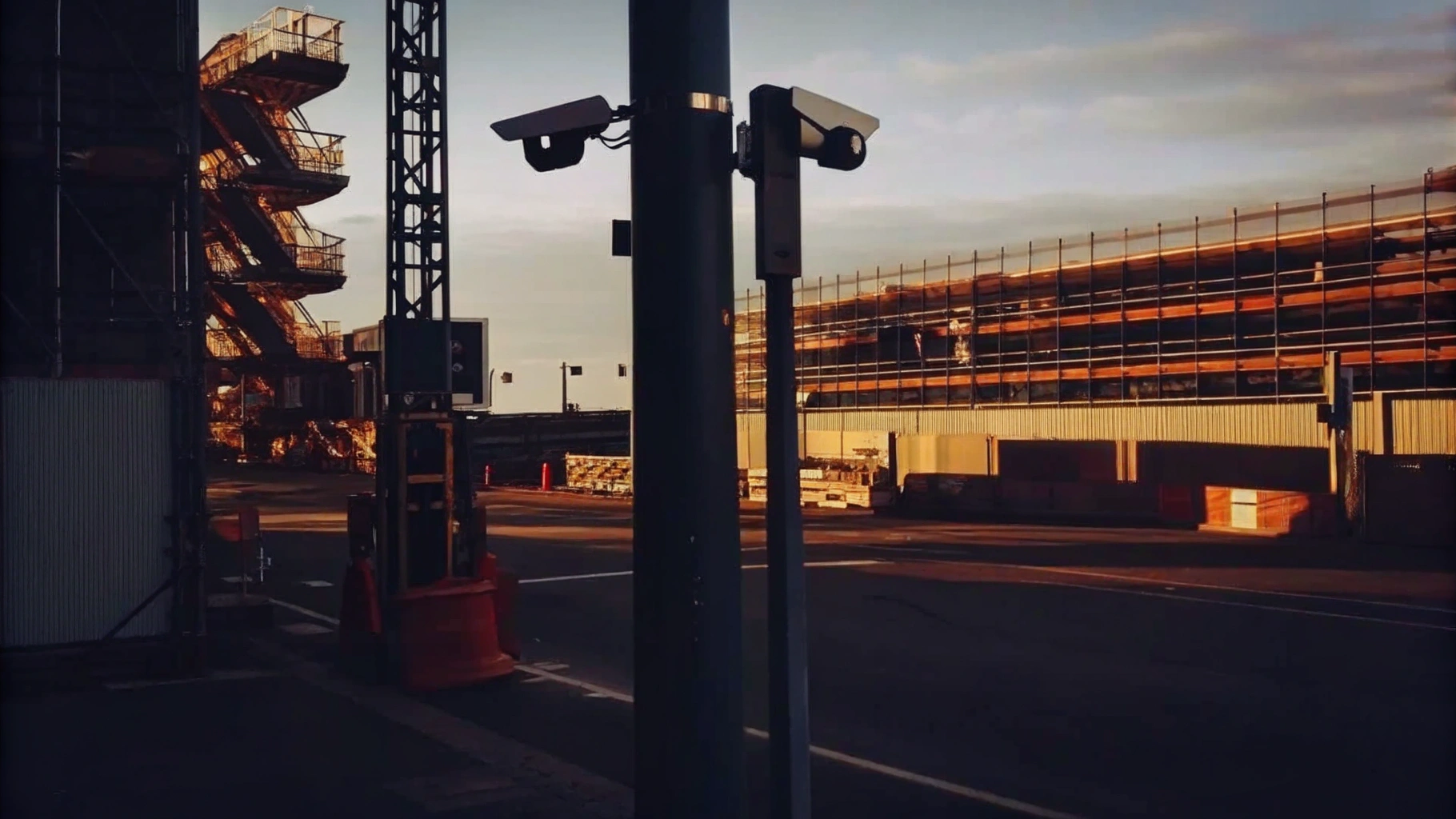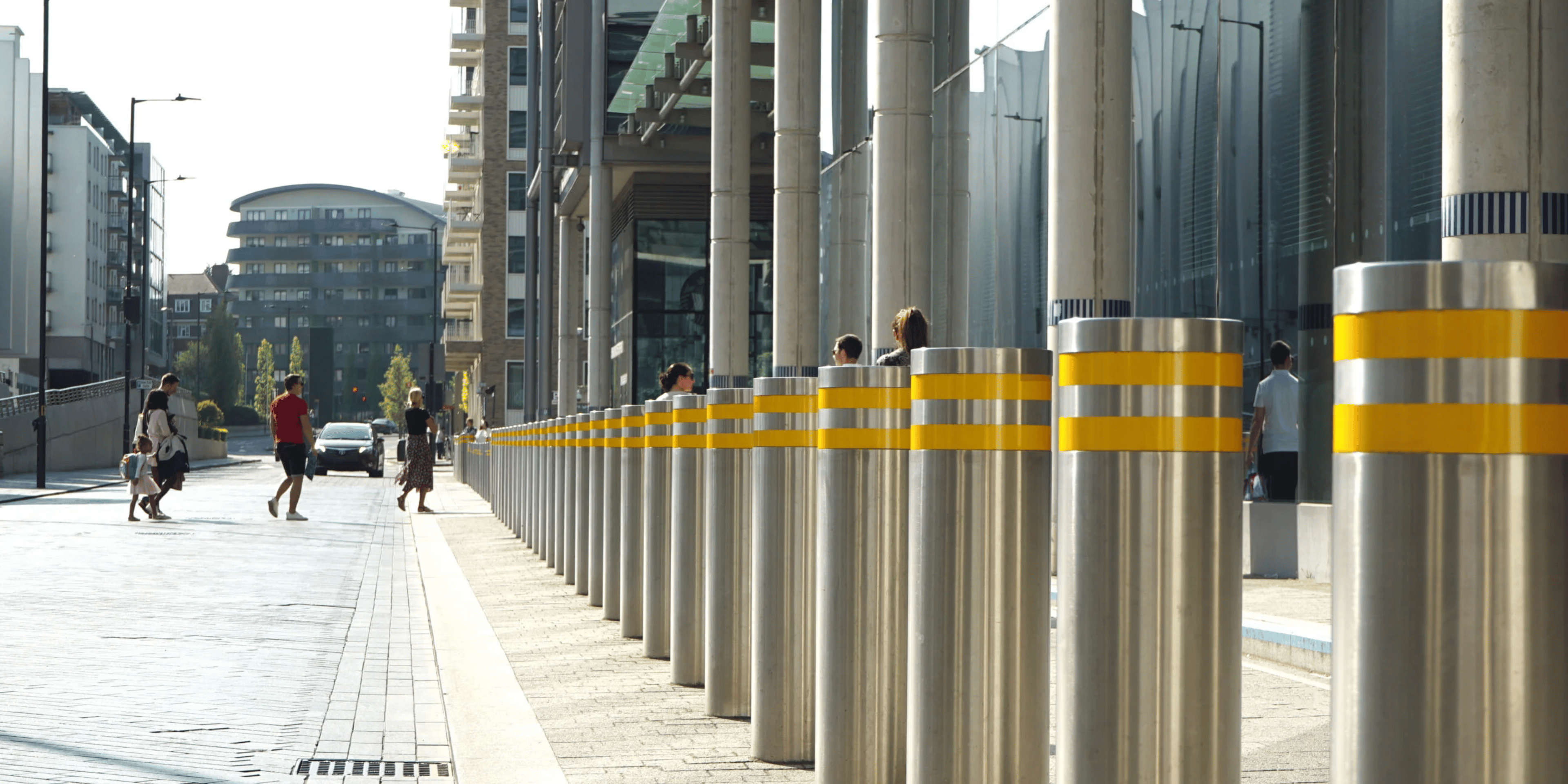
3 Best Practices for Industrial Security on Construction Sites

Overview
Effective industrial security on construction sites hinges on three best practises:
- Implementing access control measures
- Utilising CCTV surveillance
- Employing trained on-site guards
These strategies are essential as they serve to deter theft and vandalism, enhance safety compliance, and foster a safer working environment. The reality is that such measures protect valuable assets and significantly minimise financial losses associated with security breaches.
Ignoring these security risks can lead to substantial financial, operational, and reputational consequences for businesses. Construction theft alone costs UK companies over £1 million a week, underscoring the critical need for robust security protocols. In practise, the absence of these measures not only jeopardises assets but also disrupts project timelines and damages stakeholder trust.
Priority First stands as a pragmatic solution to these challenges. By prioritising security, businesses can safeguard their investments and ensure operational continuity. Our record speaks for itself: we have secured over £1.6 billion in assets and offer rapid response times to incidents. Early investment in security is not merely an expense; it is a strategic move towards long-term resilience and stability in the construction sector.
Introduction
The construction industry faces a significant challenge: over 92% of tradespeople report theft, making construction sites prime targets for criminal activity and resulting in substantial financial losses. This reality underscores the critical importance of industrial security. For businesses, the implications are clear; inadequate protection can lead to not only immediate financial setbacks but also long-term operational disruptions and reputational damage.
Ignoring these risks is not an option. The financial consequences of theft can exceed £1 million a week for UK businesses, a staggering figure that highlights the urgency of addressing security concerns. As such, it is imperative for construction stakeholders to implement effective security measures that not only safeguard valuable assets but also contribute to a safer working environment.
Priority First emerges as a pragmatic solution in this landscape. With a proven track record of securing over £1.6 billion in assets and rapid response times, the company positions itself as a trusted partner in navigating these challenges. By prioritising security, construction professionals can mitigate risks and ensure project success amidst rising threats, reinforcing the notion that early investment in security is essential to prevent greater losses later.
Understand the Importance of Industrial Security in Construction
Industrial protection at building sites is essential due to the high value of materials and equipment, coupled with the continuous presence of staff and visitors. Notably, over 92% of tradespeople report experiencing theft, highlighting that construction sites are prime targets for criminal activity. This reality leads to substantial financial losses, potentially reaching millions each year. Insufficient protection not only increases the risk of theft and vandalism but also results in safety violations, which can incur legal repercussions and project delays. For instance, theft-related downtime can inflate labour costs, as workers may need to remain on-site longer than initially planned, thereby increasing operational expenses and risking penalties from clients for missed deadlines.
Implementing robust protective measures, such as trained personnel, CCTV surveillance, and access control systems, is vital for industrial security, safeguarding assets and ensuring compliance with safety regulations. These proactive strategies not only protect physical assets but also cultivate a safer working environment, enhancing productivity and contributing to the successful completion of projects. The lesson is clear: by prioritising safety, stakeholders can effectively mitigate risks, maintain project timelines, and ultimately protect their investments.
Implement Effective Security Measures for Construction Sites
To implement effective security measures on construction sites, consider the following strategies:
-
Access Control: Establish controlled entry points to limit access to authorised personnel only. Utilise ID badges, biometric scanners, or key cards to monitor access to and from the location. This method not only improves protection but also guarantees adherence to safety protocols, as unauthorised access can result in considerable risks.
-
CCTV Surveillance: Instal high-definition CCTV cameras to ensure ongoing observation of the location. Ensure that cameras cover all critical areas, including entrances, storage zones, and equipment locations. Priority First provides advanced monitoring systems that can deliver real-time alerts for suspicious activities, greatly decreasing response times and improving overall site safety. Statistics indicate that crime cost the construction industry £800 million in 2019, underscoring the importance of effective surveillance. Furthermore, Priority First can connect its CCTV systems with current protection arrangements, ensuring a smooth improvement of your existing safety measures.
-
On-Site Guards: Employ trained staff to conduct regular patrols. Their visible presence acts as a deterrent against theft and vandalism, while also providing immediate response capabilities in case of incidents. The incorporation of Priority First's staff with technology, such as mobile patrols and remote monitoring, can further improve safety at the location. For example, in a recent project at a multi-use complex in Chelsea, Priority First's staff effectively handled security challenges, ensuring a secure environment for both labourers and visitors.
-
Lighting: Ensure adequate lighting throughout the site, particularly in areas vulnerable to theft or accidents. Well-lit environments not only deter criminal activity but also improve safety for workers, reducing the likelihood of accidents during night shifts or in poorly lit areas.
-
Secure Storage: Utilise lockable containers for valuable equipment and materials. Implement GPS tracking devices for high-value items to facilitate recovery in the event of theft. This proactive measure is essential, as statistics show that approximately 90% of stolen items in the building sector are never retrieved. The recent theft of a JCB telehandler in Nottinghamshire demonstrates the serious consequences of insufficient protective measures, disrupting builders' operations and emphasising the need for thorough safeguarding.
By implementing these strategies, building locations can greatly enhance their protection stance, shielding both resources and staff against the increasing wave of industry-related crime.

Train Personnel and Ensure Compliance with Security Protocols
Educating staff on safety procedures is essential for maintaining a safe construction site. Regular training sessions are crucial to inform all staff about the importance of safeguarding and their duties in upholding it. This training should cover how to recognise suspicious behaviour and the appropriate reporting protocols.
All personnel must be well-informed about emergency response procedures, including evacuation plans and protocols for managing incidents. Conducting regular drills strengthens these procedures and prepares staff for real-life situations.
Establishing a robust system for monitoring adherence to safety protocols is necessary. This can involve regular audits, check-ins, and feedback sessions to identify and address any compliance gaps.
Cultivating an environment of ongoing enhancement by actively seeking input from staff regarding protective measures is vital. This method not only assists in identifying areas for improvement but also fosters a sense of responsibility among employees, making them more engaged in safeguarding the premises.
By prioritising these training and compliance measures, construction sites can cultivate a security-conscious culture that empowers personnel to actively contribute to the industrial security of their environment.

Conclusion
Implementing effective industrial security measures on construction sites is not merely a precaution; it is an essential requirement. The high value of materials and equipment, coupled with the frequent presence of workers and visitors, creates a vulnerable environment that necessitates robust protective strategies. By prioritising security, stakeholders can safeguard their investments, mitigate risks, and ensure compliance with safety regulations.
Key strategies for enhancing construction site security encompass:
- Establishing controlled access points
- Installing comprehensive CCTV surveillance
- Employing trained on-site guards
- Ensuring adequate lighting
- Utilising secure storage solutions
Collectively, these measures contribute to a safer working environment, deter criminal activity, and protect vital resources. Furthermore, ongoing training and compliance monitoring empower personnel to actively participate in maintaining security protocols, fostering a culture of safety and vigilance.
Ultimately, the significance of industrial security in construction cannot be overstated. By adopting best practises and leveraging advanced technologies, construction sites can substantially mitigate risks associated with theft and safety violations. Stakeholders are urged to take proactive steps in reinforcing security measures, as doing so not only protects assets but also enhances overall project success and worker safety.
Frequently Asked Questions
Why is industrial security important in construction?
Industrial security is crucial in construction due to the high value of materials and equipment on-site, along with the constant presence of staff and visitors. It helps prevent theft and vandalism, which can lead to significant financial losses and safety violations.
What percentage of tradespeople report experiencing theft on construction sites?
Over 92% of tradespeople report experiencing theft, indicating that construction sites are major targets for criminal activity.
What are the potential financial impacts of insufficient industrial security?
Insufficient industrial security can lead to substantial financial losses, potentially reaching millions each year, due to theft, vandalism, legal repercussions from safety violations, and project delays.
How can theft-related downtime affect operational costs?
Theft-related downtime can inflate labour costs, as workers may need to stay on-site longer than planned, increasing operational expenses and risking penalties from clients for missed deadlines.
What protective measures can be implemented to enhance industrial security?
Robust protective measures include trained personnel, CCTV surveillance, and access control systems, which help safeguard assets and ensure compliance with safety regulations.
How do proactive security strategies benefit construction projects?
Proactive security strategies not only protect physical assets but also create a safer working environment, enhance productivity, and contribute to the successful completion of projects.
What is the overall lesson regarding industrial security in construction?
By prioritising safety and implementing effective security measures, stakeholders can mitigate risks, maintain project timelines, and protect their investments.




